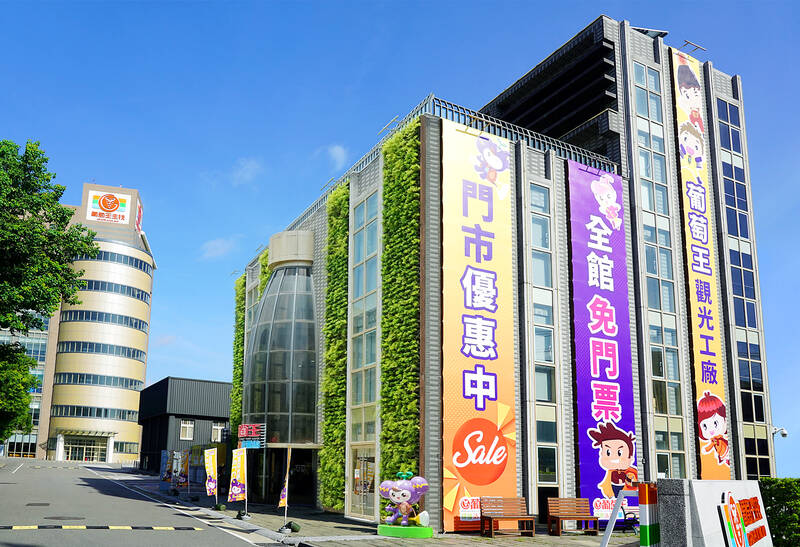Health food company Grape King Bio Ltd’s (葡萄王) board of directors yesterday approved a proposal to distribute a cash dividend of NT$6.9 per common share, the highest in the company’s history.
The proposal, if approved by shareholders on May 31, would represent a dividend yield of 3.88 percent, based on yesterday’s closing share price of NT$178 in Taipei trading.
It would have a payout ratio of 70.12 percent, compared with earnings per share of NT$9.84 last year, the highest the supplier of probiotics and mycelium-based health foods has posted in the past five years.

Photo courtesy of Grape King Bio Ltd
Grape King, which produces the Come Best tonic drink and Granoderma King nutritional supplements, said direct-sales subsidiary Pro-Partner Inc (葡眾), and manufacturing and sales channel support from its Taiwan and Shanghai operations were its major growth engines.
While Shanghai Grape King Enterprise Co’s (上海葡萄王) performance last year was affected by China’s COVID-19 pandemic-related restrictions, a firm contribution from operations in Taiwan boosted the company’s net profit last year to NT$2.17 billion (US$71.14 million), up 11.4 percent from 2021, while consolidated revenue increased 6.05 percent to NT$10.39 billion, the highest ever.
Gross margin was 81.61 percent last year, up from 80.17 percent in 2021, while operating margin rose 0.96 percentage points to 24.55 percent, the company said in a filing to the Taiwan Stock Exchange.
The firm said in a statement that additional sales channels and new products helped lift its own-brand business last year, while its contract manufacturing business also benefited from increasing global demand for immunity-boosting products, such as probiotic supplements, during the pandemic.
Pro-Partner last year maintained its growth momentum thanks to new product launches and membership expansion, with sales rising 9.08 percent year-on-year to NT$8.73 billion last year, it added.
The company said it holds a positive outlook for its operations in China this quarter, as Shanghai Grape King has resumed normal operations after the country scrapped its strict COVID-19 measures late last year.
“In the post-pandemic era, the public’s health awareness is on the rise and the demand for health food has the opportunity to increase significantly,” the company said in the statement.
However, consolidated revenue last month fell 39.98 percent month-on-month and declined 4.96 percent year-on-year to NT$666.33 million due to the Lunar New Year holiday, it said.
The company expects revenue to rebound this month and is confident that it can maintain robust operations this year, as it is planning to continue its diversification strategy, enhance product development and meet the needs of brand customers, it added.

CAUTIOUS RECOVERY: While the manufacturing sector returned to growth amid the US-China trade truce, firms remain wary as uncertainty clouds the outlook, the CIER said The local manufacturing sector returned to expansion last month, as the official purchasing managers’ index (PMI) rose 2.1 points to 51.0, driven by a temporary easing in US-China trade tensions, the Chung-Hua Institution for Economic Research (CIER, 中華經濟研究院) said yesterday. The PMI gauges the health of the manufacturing industry, with readings above 50 indicating expansion and those below 50 signaling contraction. “Firms are not as pessimistic as they were in April, but they remain far from optimistic,” CIER president Lien Hsien-ming (連賢明) said at a news conference. The full impact of US tariff decisions is unlikely to become clear until later this month

GROWING CONCERN: Some senior Trump administration officials opposed the UAE expansion over fears that another TSMC project could jeopardize its US investment Taiwan Semiconductor Manufacturing Co (TSMC, 台積電) is evaluating building an advanced production facility in the United Arab Emirates (UAE) and has discussed the possibility with officials in US President Donald Trump’s administration, people familiar with the matter said, in a potentially major bet on the Middle East that would only come to fruition with Washington’s approval. The company has had multiple meetings in the past few months with US Special Envoy to the Middle East Steve Witkoff and officials from MGX, an influential investment vehicle overseen by the UAE president’s brother, the people said. The conversations are a continuation of talks that

CHIP DUTIES: TSMC said it voiced its concerns to Washington about tariffs, telling the US commerce department that it wants ‘fair treatment’ to protect its competitiveness Taiwan Semiconductor Manufacturing Co (TSMC, 台積電) yesterday reiterated robust business prospects for this year as strong artificial intelligence (AI) chip demand from Nvidia Corp and other customers would absorb the impacts of US tariffs. “The impact of tariffs would be indirect, as the custom tax is the importers’ responsibility, not the exporters,” TSMC chairman and chief executive officer C.C. Wei (魏哲家) said at the chipmaker’s annual shareholders’ meeting in Hsinchu City. TSMC’s business could be affected if people become reluctant to buy electronics due to inflated prices, Wei said. In addition, the chipmaker has voiced its concern to the US Department of Commerce

STILL LOADED: Last year’s richest person, Quanta Computer Inc chairman Barry Lam, dropped to second place despite an 8 percent increase in his wealth to US$12.6 billion Staff writer, with CNA Daniel Tsai (蔡明忠) and Richard Tsai (蔡明興), the brothers who run Fubon Group (富邦集團), topped the Forbes list of Taiwan’s 50 richest people this year, released on Wednesday in New York. The magazine said that a stronger New Taiwan dollar pushed the combined wealth of Taiwan’s 50 richest people up 13 percent, from US$174 billion to US$197 billion, with 36 of the people on the list seeing their wealth increase. That came as Taiwan’s economy grew 4.6 percent last year, its fastest pace in three years, driven by the strong performance of the semiconductor industry, the magazine said. The Tsai